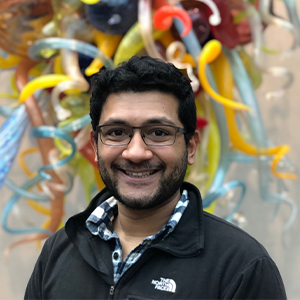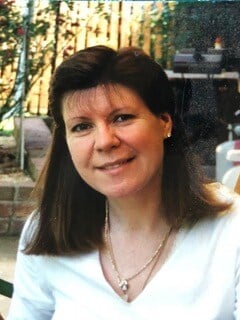 The winner of Pollak's 2019 scholarship was Ashley Vasnaik, who wrote an articulate essay on why immigration matters in America.
The winner of Pollak's 2019 scholarship was Ashley Vasnaik, who wrote an articulate essay on why immigration matters in America.
Ashley is currently a graduate student at Otterbein University in Westerville, Ohio, where he's pursuing a Master of Science in Nurse Anesthesia.
We loved reading his narrative about his experience as a first-generation immigrant in the United States, and we would like to share it with our readers. Read his winning essay below.
Why immigration matters in America.
The year is 1994. A young nurse is standing at the departure terminal of Muscat (Oman) International Airport waiting to board a plane bound for Saint Louis, MO. In her right hand she has her boarding pass. In her mind she has her goals, hopes, and dreams for her future. In her heart she holds her three children and husband who she will leave in the Middle East in pursuit of a brighter future for her family.
Upon arrival to The United States of America, she is greeted by the cold and snow of a midwestern winter. This new land, with its customs, culture, and weather, induced feelings of anxiety as well as excitement for the next chapter in her life. With the help of new friends and acquaintances, she was welcomed in as a proud and driven immigrant.
She settled In Effingham, IL, having accepted a contract to work at a nursing home that employed nurses of foreign origin. Three weeks prior, she had worked at the Royal Oman Police Hospital, as a Registered Nurse (RN) with a Bachelor of Science in Nursing (BSN), in a high acuity labor and delivery unit. Though the position in the nursing home was not her ideal, she knew that the return on investment of leaving the comfort and safety of a job and country that she had known for the previous decade would be exponential.
This is the story that many immigrant families across America can relate to.
Separation, sacrifices, and grit in all aspects of their life. I share the story of this mother as this is the story of my mother, Blanche Maria Vasnaik. This is also the story of me.
My name is Ashley Casimir Vasnaik and I attend the Otterbein University-Grant Medical Center Nurse Anesthesia program. Upon completion of my program, and passing the National Certification Exam (NCE), I will become a Certified Registered Nurse Anesthetist (CRNA) with a Master of Science in Nurse Anesthesia. My older sister, Kristina Ann Vasnaik, also attends my program’s cohort and thus we will graduate together.
As mentioned above, my mother had made the ultimate sacrifice that a parent can make by choosing to leave their family to follow the goal of life, liberty, and the pursuit of happiness. These “unalienable rights,” are clearly outlined in the United States Declaration of Independence. These rights have been given to all humans and must be protected by the United States government as it is charged with caring for it’s citizens as well as immigrants who are seeking a better quality of life. In her pursuit of these rights, my mother, and furthermore family, had to overcome many obstacles and challenges that led us to where we are today.
My father, sisters, and I moved to Effingham, IL in the winter of 1995. Though it was a culture shock, the path to citizenship that my mother had paved was extremely humbling to navigate. I watched as my parents worked diligently from 1997 until 2003 to accomplish this goal for the benefit of our family. This included driving multiple times from central Illinois to Chicago, IL, in the winter with three children between the ages of four and eight. My parents had to make this journey to be able to review, complete, and submit documents that were necessary to obtain US Citizenship.
My mother worked and saved as much as possible while my father, an ex-Indian Air Force pilot and mechanical engineer, waited for approval to start working. My father initially took a position in a paper-making plant and worked the night shift to earn additional income to support our family of five. My parents took it upon themselves to take jobs that were below their skill levels and previous pay grades to be able to provide for our family. They are model immigrants for others to emulate with their drive, perseverance, and passion for wanting to contribute to our well-being but more importantly to the advancement of the United States. Immigrants from all over the world bring these same traits and characteristics to this country to contribute to our workforce and economy. These individuals should be praised and encouraged, instead of being imprisoned and turned away at our borders, for wanting to better their lives while advancing our country.
As a family, we earned United States citizenship in 2003! This is by far one of our proudest familial accomplishments. Thus, my parents have always been extremely supportive and encouraging of my perseverance to assimilate into American culture. But they also reminded my sisters and I that education was one of the most important reasons that we moved our entire family to this wonderful country. From an early age, my siblings and I began to develop a passion for learning, and a strong sense of grit, as we pursued our educational opportunities.
Angela Duckworth (2016), the author of Grit, defines this term as “passion and sustained persistence applied toward long-term achievement, with no particular concern for rewards or recognition along the way.” In addition to our family earning US citizenship, my younger sister earned her bachelor’s degree in business and marketing
while my older sister and I earned our Bachelor’s of Science in Nursing (BSN) degrees. My older sister and I have continued to pursue our graduate degrees in Nurse Anesthesia. Following in the footsteps of our mother, my older sister and I went into this field to care for the ailing individuals of this amazing country that accepted my family and I with open arms. We decided to pursue graduate degrees in nurse anesthesia as we knew that this was the ultimate testament to the resolve and drive that immigrants can have when given the opportunity to receive a highly sought-after American education.
Before this, I started my nursing career in 2011 after I graduated from The University of Portland with my BSN. I have since worked in a variety of hospital settings in Philadelphia, Texas, and Oregon. One of my main career goals is to foster my passion for advocacy within my profession. I began this journey when I became an Intensive Care Unit Registered Nurse (ICU RN) at Parkland Memorial Hospital in Dallas, TX in 2013.
From the start of my ICU career, I knew that I was one of the only individuals who could advocate for my patients, who often lack a voice in the enormous health care system within which we work. These individuals were some of the most indigent members of the Dallas-Fort Worth community. They were often overlooked, often lacking access to basic healthcare, due to their lower socio-economic, immigrant, and/or undocumented status. I knew that no matter what their circumstances were, it was my duty and responsibility to be the advocate they needed.
This in itself was such a humbling experience as I was the individual who often had to educate my peers on diversity and cultural competence. I can recall moments where I was the most proficient Spanish speaker or even cultural “expert” on Middle Eastern of South East Asian cultures. I thus took this opportunity to work with my patients and their families, as well as my coworkers to provide a safe, culturally competent, and accepting environment.
Another career goal is to continue working with college bound youth to help support and encourage their transition into the health sciences as well as into the nurse anesthesia profession. I have taken the spirit of advocacy and education even further, and outside of the hospital setting, by speaking with high school aged youths about their ability to enter the medical field. This has manifested by speaking to these students about nurse anesthesia and their future educational and professional trajectories to become a CRNA. The high school that I have worked with is predominantly composed of students from Nepalese and African backgrounds. It is such an inspiring experience to be able to speak and educate these students, who are immigrants just like myself, while encouraging them to pursue undergraduate and graduate studies. I am working with my program director, Brian Garrett, to reach out to more schools and students to help educate them on the field within which I am so passionately working.
As a first-generation immigrant, who has been exposed to the citizenship and naturalization process, I am proud of the steps my parents took to achieve this goal. My parents work ethic, just as other immigrants, is a demonstration and attestation to the grit and diligence that individuals who are seeking citizenship utilize. My parents overcame hurdles then, just as walls are being erected today, to achieve a goal of making this country a diverse and thriving nation that invites others in and encourages their contributions and diversity.
According to the Migration Policy Institute, immigrants represent “almost 17 percent of the 12.4 million people in the United States working as doctors, nurses, dentists, and in other health-care occupations in 2015” (Migration Policy Institute, 2017). This article goes on to state that, “health-care occupations will have the highest risk of labor shortages…in the next decade” (Migration Policy Institute, 2017).
With an increasing number of aging and ailing individuals, our country is in need of foreign-born medicinal professionals who can provide care that is so urgently needed. Immigrants can be, and are, the answer to the question of how to provide care to increasing numbers of lower socio-economic, indigent, underserved, and critical access communities. Immigrants have made the sacrifice to leave their countries of origin to provide care to these communities and thus should be applauded, supported, and encouraged.
Diversity in all shapes and forms is significant to the improvement and encouragement of our culture and society in terms of inclusion and engagement. According to Dr. Caleb Rosado, seven actions are involved in defining multiculturalism. These actions are “recognition…respect…acknowledging…valuing…encouraging…empowering…and celebrating” (Purdue University Global, 2012).
As one can see, these are positive terms that build up the individual instead of demeaning and degrading them. I find it so incredible that upon arrival to the United States, US citizens gave my family and I a chance by getting to know us and accepting us as their neighbors and friends. This metaphorical “olive branch” must continue to be extended to immigrants who are seeking to contribute to our society in a productive and positive manner. It is the diverse contributions of immigrants, in combination with present American culture, that continue to drive our country forward while attracting others who want to work towards a better life in the United States of America.
This country is thus a “melting pot” which is comprised of community members from all areas of the globe. Being able to find the inherent value in another individuals culture and diverse background is imperative in the advancement of our country. We have to develop trust, understanding, and respect for all cultures to continue to attract and accept the individuals who yearn to relocate for a better quality of life. Diverse thoughts, new knowledge and technology, distinct language skills as well as different experiences and unique foods are just a small portion of the interesting aspects that immigrants bring to this country.
These aspects of diversity are what shape American culture. We are a group of individuals who have origins of different ethnic, religious, or cultural backgrounds which make us all unique. It is inclusion and the encouragement of diversity that will continue to erode old and new walls that have been implemented by xenophobic individuals who do not see the inherent worth of multiculturalism. Their fervor for homogeneity in the current era only works to stifle American progress while alienating and segregating our population. As I was once an outsider looking in, I applaud the champions who are making our nation even better by providing comprehensive immigration solutions by supporting immigration and immigrants’ rights. It is not just the correct thing to do, but it is the American thing to do. I therefore am a proud American citizen.
References
Duckworth, A. (2016). Grit: The power of passion and perseverance. New York, NY, US: Scribner/Simon & Schuster.
Immigrant Health-Care Workers in the United States. June 2017. Migration Policy Institute, Washington, DC. Retrieved from https://www.migrationpolicy.org/article/immigrant-health-care-workers- united-states#Trends_Projections
What is Cultural Diversity? December 2012. Purdue University Global. Retrieved from: https://www.purdueglobal.edu/blog/social-behavioral-sciences/what-is-cultural- diversity/




